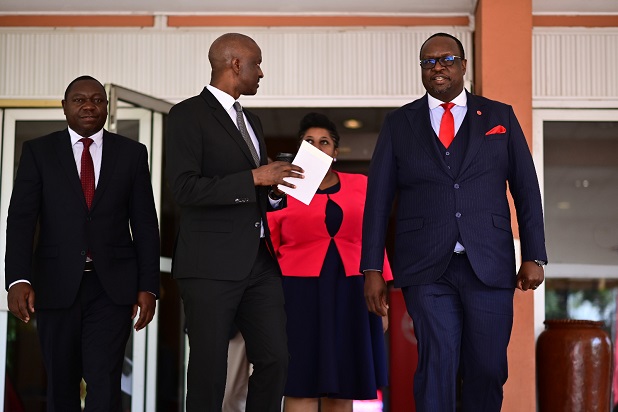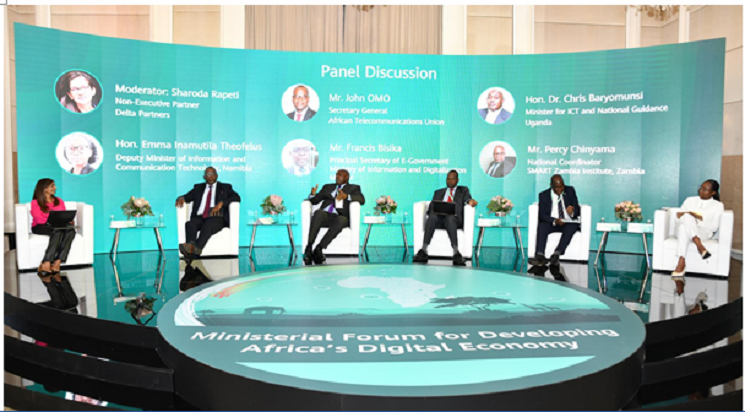Absa Bank MD, Mumba Kalifungwa (R) chats with Finance Ministry PS Ggoobi during Post Budget Dialogue
The Finance Ministry Permanent Secretary/ Secretary to Treasury Ramathan Ggoobi has outlined budget opportunities in the UGX 72Trillion Budget for the Financial Year 2024/25, urging private sector players to take advantage of them.
This, he said while delivering a keynote speech during the 2024 Post Budget Dialogue organised by Absa Bank Uganda in collaboration with Deloitte among other partners on 14th June 2024 at Kampala Serena Hotel.
“In the next financial year, we have allocated funds for wealth creation initiatives commercial agriculture, and value addition; the Parish Development Model brings more people into the money economy. We have capitalized UDB to provide patient, low-cost capital to support enterprises. There’s money Emyooga, Agriculture credit facility (ACF), etc (shs 2.64 trillion),” he stated.
Ggoobi added, “We have allocated money to skilling the youth and support to small-scale businesses; we are working with the Private Sector Foundation of Uganda to ensure that women-owned businesses mature into formalisation.”
He said the private sector including banks need to align to support and benefit from key budget themes including but not limited to agro industrialisation, mineral development, and tourism ecosystem among others.
On budget priorities for Financial Year 2024/24, Ggoobi pointed at investing in the people of Uganda through education, health, water, and sanitation with a budgetary allocation of UGX 10.2Trillion, Peace and Security (UGX 9.1Trillion), maintenance of infrastructure (UGX 5Trillion) among others.
The Absa Bank Uganda Managing Director, Mumba Kalifungwa said the Financial Year 2024/25 National Budget represents a crucial milestone in Uganda’s economic development, setting the tone for the fiscal policy and outlining the government’s revenue and expenditure priorities for the coming year.
“I would like to commend the government for its commitment to driving economic growth and fostering an environment that supports sustainable development. The 2024/25 National Budget has outlined several key areas that we believe will significantly contribute to our nation’s progress.”
He added, “Our economy has remained resilient and is projected to grow at 6% albeit a slowdown in quarter-on-quarter growth. From a global perspective, uncertainty remains on the impact of geopolitics, international commodity prices, weaker global growth, global inflation and monetary policy responses on our economy.”
Allan Ssenyondwa, the Policy and Advocacy Manager at Uganda Manufacturers Association (UMA) said that although the Government’s priorities in the next financial year are good, the Government needs to move from the macro level to the micro level.
“The manufacturing sector is producing at 54%, how about if we shift the level of production to 80%? People forget to tell you that some manufacturers are exiting the Ugandan market. What we have to do is to ensure that we have an inclusive economy.”
Revenue sources
Ggoobi said the number one major source of revenues to finance the Financial Year 2024/25 National Budget is domestic revenue (both tax and non-tax) at UGX 32Trillion, Budget Support at UGX 1.4Trillion, Domestic Borrowing (UGX 9Trillion), petroleum funds and Local Government revenues (UGX 294b).
Sarah Chelangat the Commissioner – Domestic Taxes at Uganda Revenue Authority explained that for the last three years, the Government hasn’t introduced new taxes but rather focused on tax administration, which she said will continue in the Financial Year 2024/24.
“As we look into the next Financial Year, our focus is on strengthening tax administration; technologies like EFRIS will ensure automated returns that summarize sales, and net VAT payable to the Government. This is good for the country.”
Chelangati added that through digitalisation, URA will use third-party data to get advisories for the follow-up to taxpayers. Other focus sources of revenues include rental tax, local excise duty, and VAT.
“Widening tax base is what we are doing, we want this fair share of tax to Government; we are opening new stations in different areas of countrywide such as Kisoro, Ntungamo among others.





